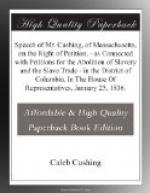The proceedings of this House in 1790, in reference to petitions on the matter of the slave trade, and of slavery in the States, have been cited. It has been said that those petitions were not received. That is a mistake, as any gentleman may satisfy himself by recurrence to the journals of the House. The petitions were received, committed, and debated on report, as I shall have occasion hereafter to state at length.
One other case is cited, that of the petition of Vicente Pazos, agent of New Granada, which, in the year 1818, the House refused to receive. But the printed debates of that day show clearly the ground of rejection. Mr. Forsyth moved that it be not received. “He stated that, as the petitioner was the agent of a foreign power, and applied to Congress as an appellate power over the Executive, he thought it improper that he should be thus heard.” And the question was decided upon this single point. I heartily approve the remarks then made by a distinguished statesman, now no more, who at that time represented Massachusetts on this floor.
Mr. Mills, of Massachusetts, said that “the right of petition was a sacred one, and belonged equally to the meanest and the greatest citizen in the nation; and if such a petition as this, implicating the conduct of the Executive, had been presented from the meanest citizen, he would receive it; and if it complained of grievances without pointing out redress, it would be the duty of the House to give the proper redness; but it was to our own citizens only he would turn this listening ear. What right had a foreign subject to petition this House?”
Sir, I have incidentally touched upon the argument of precedents, and shown how untenable it is; but I care not if there were a thousand precedents of refusal to receive petitions. Such a fact, if it existed, would not abate my zeal on this point, or shift, in the minutest degree, my position. Upon the Constitution, upon the pre-existing legal rights of the People, as understood in this country and in England, I have argued that this House is bound to revive the Petition under debate. It is impossible, in my mind, to distinguish between the refusal to receive a petition, or its summary rejection by some general order, and the denial of the right of petition. I have no such microscopic eye as to enable me to discern the point of difference between the two things. This procedure may be keeping the word to the ear, but it is breaking it to the sense: and I go upon general, abstract, original, fundamental principle, the great principle of democratic liberty, which is the foundation stone of this Republic. It is for the sacred and inalienable rights of the People that I here contend. I should regard the exclusion of petitions from the consideration of the House as a highhanded invasion of the imprescriptible rights of the Constituency of the country, of whom we are the representatives, not the dictators; and it is for that reason I take my stand against it on the very threshold.




